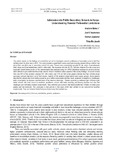Admission into Public Secondary Schools in Kenya: Understanding Parental Preferential Limitations

View/
Date
2015Author
Makori, Andrew
Chepwarwa, Joel
Jepkenei, Esther
Jacob, Priscilla
Metadata
Show full item recordAbstract
This article reports on the findings of a study that set out to investigate parents’ preference of secondary schools that their children joined for form one in 2015. The study adopted a quantitative survey approach involving parents whose children had joined form one (first year in secondary school) this year. Parents were purposively sampled for the study. A questionnaire (both closed and open-ended) was used to collect data. The response rate was 83.3%. The data obtained from the survey and especially closed-ended section of the questionnaire was analysed using the SPSS (Statistical package for social sciences) while data from open-ended section of was used to clarify or reinforce certain aspects of the survey findings. The result reveals that: over 60% of the students obtained 301- 400 marks; over 70% (n=150) of the parents claimed that their children joined secondary schools that were not of their choice; majority of the students joined district and county schools. Some parents describe the schools that their children joined as poor; without appropriate facilities; lacks academic competition or challenges; lacks of motivation for learners and that some of the teachers were lazy. Parents expected or preferred their children to join better schools with track record in academic excellence; schools with better teaching and learning facilities and also that challenges and motivates students academically. They preferred good schools that would enable their children to obtain good grades and join university. The conclusion is that parents in this study prefer their children to join schools that excelled academically. They are however limited in terms of exercising their preferences.
URI
http://www.mcser.org/journal/index.php/jesr/article/view/7703http://hdl.handle.net/123456789/3024
